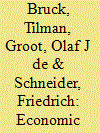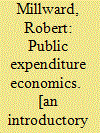|
|
|
Sort Order |
|
|
|
Items / Page
|
|
|
|
|
|
|
| Srl | Item |
| 1 |
ID:
109196


|
|
|
|
|
| Publication |
2011.
|
| Summary/Abstract |
In this article, we estimate the total costs of the German participation in the Afghanistan war, both past and future. This is a hugely complex and uncertain calculation, which depends on several important assumptions. These assumptions pertain to the different cost channels and the shares of these channels that can be attributed to the German participation in the war. By calculating the costs of the German participation, we provide a framework for other researchers to do the same with respect to other countries. The article can function as a roadmap for researchers focusing on this topic. In the end we find that, in the most realistic of several possible scenarios regarding the duration and intensity of the German participation in the war in Afghanistan, the German share of the net present value of the total costs of the war ranges from 26 billion Euro to 47 billion Euro. This large range reflects the uncertainties with which the costs must be estimated. On an annual basis, we estimate that the German participation in the war costs between 2.5 and 3 billion Euro. This contrasts with the official war budget, which is little over 1 billion Euro for 2010, showing that governments may not adequately represent the costs of military action.
|
|
|
|
|
|
|
|
|
|
|
|
|
|
|
|
| 2 |
ID:
106706


|
|
|
| 3 |
ID:
044939


|
|
|
|
|
| Publication |
London, McGraw-Hill, 1971.
|
| Description |
xi,379p.
|
| Series |
European economics series
|
| Standard Number |
070941483
|
|
|
|
|
|
|
|
|
|
|
|
Copies: C:1/I:0,R:0,Q:0
Circulation
| Accession# | Call# | Current Location | Status | Policy | Location |
| 006998 | 336.39/MIL 006998 | Main | On Shelf | General | |
|
|
|
|
| 4 |
ID:
101170


|
|
|
|
|
| Publication |
2010.
|
| Summary/Abstract |
The purpose of this article is twofold. First, we aim to evaluate the records of executive branches of the Lebanese government that are involved in public social spending in terms of their ability to respond to need. Second, we attempt to uncover the criteria underlying the distribution of public social spending. The allocation of funds across sectors and administrative districts is evaluated according to a vector of the socioeconomic characteristics of each locality thought to be of relevance. We find that the association between need and spending is, at best, very loose. When we use the geographical distribution of spending and voting data from each locality to estimate each religious sect's share of public spending, we find a striking conformity between the sectarian composition of the population and each sect's estimated share of national public spending. The logic of the disbursement of public funds and the mechanism underlying the observed one-man one-dollar distribution rule-a rule with primacy over health, education, and infrastructure needs as well as imbalances across regions-is that distribution be balanced across sects.
|
|
|
|
|
|
|
|
|
|
|
|
|
|
|
|
| 5 |
ID:
092375


|
|
|
|
|
| Publication |
2009.
|
| Summary/Abstract |
Upon becoming Conservative leader, David Cameron, and his Shadow Chancellor, George Osborne, initially sought to compete with Labour by pledging increased expenditure on education and the NHS, and thereby insisting that tax cuts would have to wait. Rather than cutting taxation overall, the emphasis was on restructuring and simplifying Britain's tax system, and shifting the burden towards the better off, mainly thorough promoting environmental taxes. However, the economic collapse at the end of 2008 has prompted the Conservatives to modify this new economic stance, by insisting that they will no longer match Labour's planned increases in public expenditure, but, instead, will increase it at a lower rate. This is intended to reduce the need to increase government borrowing during the recession, and thereby ensure that when the economy recovers, the proceeds of economic growth can be shared between higher public expenditure and lower taxation, rather than being spent on repaying government debt for many years ahead.
|
|
|
|
|
|
|
|
|
|
|
|
|
|
|
|
| 6 |
ID:
139258


|
|
|
|
|
| Summary/Abstract |
Local governments in China are seriously under-funded relative to their assigned expenditure responsibilities for public services, resulting in the infamous ‘revenue–expenditure gap’. The dominant explanation of local fiscal difficulties given in the literature refers to central government behaviour, namely the excessive centralization of tax revenue, but it does not tally with the large flows of central subsidies to local coffers in more recent years. The alternative account we put forward stresses the working of an intermediary level embedded in the multi-tiered governance structure of a large country, and the interaction between local officials' fiscal behaviour and the revenue–expenditure gap. Employing fine-grained analysis of aggregate statistics and local case data, we argue that broader intergovernmental dynamics and practices of local intermediaries, and not only central government policy, are critical to fiscal health and government performance at the county level.
|
|
|
|
|
|
|
|
|
|
|
|
|
|
|
|
|
|
|
|
|